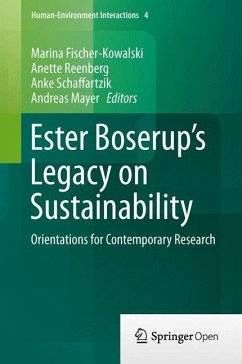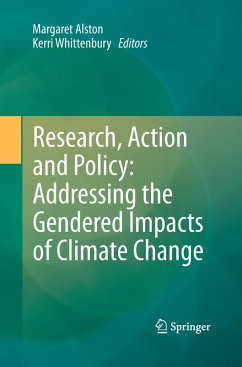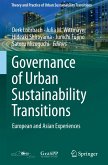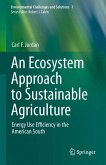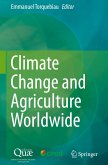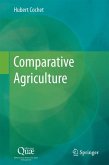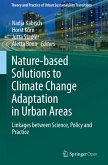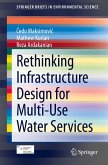Ester Boserup's Legacy on Sustainability
Orientations for Contemporary Research
Herausgegeben:Fischer-Kowalski, Marina; Reenberg, Anette; Schaffartzik, Anke; Mayer, Andreas
Ester Boserup's Legacy on Sustainability
Orientations for Contemporary Research
Herausgegeben:Fischer-Kowalski, Marina; Reenberg, Anette; Schaffartzik, Anke; Mayer, Andreas
- Gebundenes Buch
- Merkliste
- Auf die Merkliste
- Bewerten Bewerten
- Teilen
- Produkt teilen
- Produkterinnerung
- Produkterinnerung
Arising from a scientific conference marking the 100th anniversary of her birth, this book honors the life and work of the social scientist and diplomat Ester Boserup, who blazed new trails in her interdisciplinary approach to development and sustainability.
Andere Kunden interessierten sich auch für
![Research, Action and Policy: Addressing the Gendered Impacts of Climate Change Research, Action and Policy: Addressing the Gendered Impacts of Climate Change]() Research, Action and Policy: Addressing the Gendered Impacts of Climate Change76,99 €
Research, Action and Policy: Addressing the Gendered Impacts of Climate Change76,99 €![Governance of Urban Sustainability Transitions Governance of Urban Sustainability Transitions]() Governance of Urban Sustainability Transitions98,99 €
Governance of Urban Sustainability Transitions98,99 €![An Ecosystem Approach to Sustainable Agriculture An Ecosystem Approach to Sustainable Agriculture]() Carl F. JordanAn Ecosystem Approach to Sustainable Agriculture76,99 €
Carl F. JordanAn Ecosystem Approach to Sustainable Agriculture76,99 €![Climate Change and Agriculture Worldwide Climate Change and Agriculture Worldwide]() Climate Change and Agriculture Worldwide136,99 €
Climate Change and Agriculture Worldwide136,99 €![Comparative Agriculture Comparative Agriculture]() Hubert CochetComparative Agriculture76,99 €
Hubert CochetComparative Agriculture76,99 €![Nature-Based Solutions to Climate Change Adaptation in Urban Areas Nature-Based Solutions to Climate Change Adaptation in Urban Areas]() Nature-Based Solutions to Climate Change Adaptation in Urban Areas38,99 €
Nature-Based Solutions to Climate Change Adaptation in Urban Areas38,99 €![Rethinking Infrastructure Design for Multi-Use Water Services Rethinking Infrastructure Design for Multi-Use Water Services]() Cedo MaksimovicRethinking Infrastructure Design for Multi-Use Water Services38,99 €
Cedo MaksimovicRethinking Infrastructure Design for Multi-Use Water Services38,99 €-
-
-
Arising from a scientific conference marking the 100th anniversary of her birth, this book honors the life and work of the social scientist and diplomat Ester Boserup, who blazed new trails in her interdisciplinary approach to development and sustainability.
Produktdetails
- Produktdetails
- Human-Environment Interactions 4
- Verlag: Austrian Science Fund / Springer / Springer Netherlands
- Artikelnr. des Verlages: 978-94-017-8677-5
- 2014
- Seitenzahl: 296
- Erscheinungstermin: 2. September 2014
- Englisch
- Abmessung: 241mm x 160mm x 22mm
- Gewicht: 561g
- ISBN-13: 9789401786775
- ISBN-10: 9401786771
- Artikelnr.: 40061544
- Herstellerkennzeichnung
- Springer-Verlag GmbH
- Tiergartenstr. 17
- 69121 Heidelberg
- ProductSafety@springernature.com
- Human-Environment Interactions 4
- Verlag: Austrian Science Fund / Springer / Springer Netherlands
- Artikelnr. des Verlages: 978-94-017-8677-5
- 2014
- Seitenzahl: 296
- Erscheinungstermin: 2. September 2014
- Englisch
- Abmessung: 241mm x 160mm x 22mm
- Gewicht: 561g
- ISBN-13: 9789401786775
- ISBN-10: 9401786771
- Artikelnr.: 40061544
- Herstellerkennzeichnung
- Springer-Verlag GmbH
- Tiergartenstr. 17
- 69121 Heidelberg
- ProductSafety@springernature.com
Andreas Mayer, geboren 1970 in Wien, studierte Soziologie und Wissenschaftsgeschichte in Wien, Paris, Cambridge und Bielefeld. Von 2005-2007 lehrte er an der Universität Cambridge sowie als Gast an der EHESS (Paris) und an der University of Chicago. Seit Herbst 2007 ist er wissenschaftlicher Mitarbeiter in Abteilung II am Max-Planck-Institut für Wissenschaftsgeschichte in Berlin.
PART I: Ester Boserup's Intellectual Heritage.- 1. Ester Boserup: An Interdisciplinary Visionary Relevant for Sustainability.- 2. "Finding Out Is My Life": Conversations with Ester Boserup in the 1990s.- 3. Boserup's Theory on Technological Change as a Point of Departure for the Theory of Sociometabolic Regime Transition.- PART II Land Use, Technology and Agriculture.- 4. The Dwindling Role of Population Pressure in Land Use Change - a Case from the South West Pacific.- 5. Conceptual and Empirical Approaches to Mapping and Quantifying Land-Use Intensity.- 6. Malthusian Assumptions, Boserupian Response in Transition to Agriculture Models.- 7. Reconciling Boserup with Malthus: Agrarian Change and Soil Degradation in Olive Orchards in Spain (1750-2000).- 8. Beyond Boserup: The Role of Working Time in Agricultural Development.- PART III: Population and Gender.- 9. Following Boserup's Traces: From Invisibility to Informalisation of Women's Economy to Engendering Development in Translocal Spaces.- 10. Daughters of the Hills: Gendered Agricultural Production, Modernisation, and Declining Child Sex Ratios in the Indian Central Himalayas.- 11. Revisiting Boserup's Hypotheses in the Context of Africa.- 12. An Interpretation of Large-Scale Land Deals Using Boserup's Theories of Agricultural Intensification, Gender and Rural Development.- 13. Labour Migration and Gendered Agricultural Asset Shifts in Southeastern Mexico: Two Stories of Farming Wives and Daughters.- 14. Working Time of Farm Women and Small-Scale Sustainable Farming in Austria.- 15. A Human Ecological Approach to Ester Boserup: Steps Towards Engendering Agriculture and Rural Development.- 16. Conclusions: Re-Evaluating Boserup in the Light of the Contributions to this Volume.
PART I: Ester Boserup's Intellectual Heritage.- 1. Ester Boserup: An Interdisciplinary Visionary Relevant for Sustainability.- 2. "Finding Out Is My Life": Conversations with Ester Boserup in the 1990s.- 3. Boserup's Theory on Technological Change as a Point of Departure for the Theory of Sociometabolic Regime Transition.- PART II Land Use, Technology and Agriculture.- 4. The Dwindling Role of Population Pressure in Land Use Change - a Case from the South West Pacific.- 5. Conceptual and Empirical Approaches to Mapping and Quantifying Land-Use Intensity.- 6. Malthusian Assumptions, Boserupian Response in Transition to Agriculture Models.- 7. Reconciling Boserup with Malthus: Agrarian Change and Soil Degradation in Olive Orchards in Spain (1750-2000).- 8. Beyond Boserup: The Role of Working Time in Agricultural Development.- PART III: Population and Gender.- 9. Following Boserup's Traces: From Invisibility to Informalisation of Women's Economy to Engendering Development in Translocal Spaces.- 10. Daughters of the Hills: Gendered Agricultural Production, Modernisation, and Declining Child Sex Ratios in the Indian Central Himalayas.- 11. Revisiting Boserup's Hypotheses in the Context of Africa.- 12. An Interpretation of Large-Scale Land Deals Using Boserup's Theories of Agricultural Intensification, Gender and Rural Development.- 13. Labour Migration and Gendered Agricultural Asset Shifts in Southeastern Mexico: Two Stories of Farming Wives and Daughters.- 14. Working Time of Farm Women and Small-Scale Sustainable Farming in Austria.- 15. A Human Ecological Approach to Ester Boserup: Steps Towards Engendering Agriculture and Rural Development.- 16. Conclusions: Re-Evaluating Boserup in the Light of the Contributions to this Volume.

